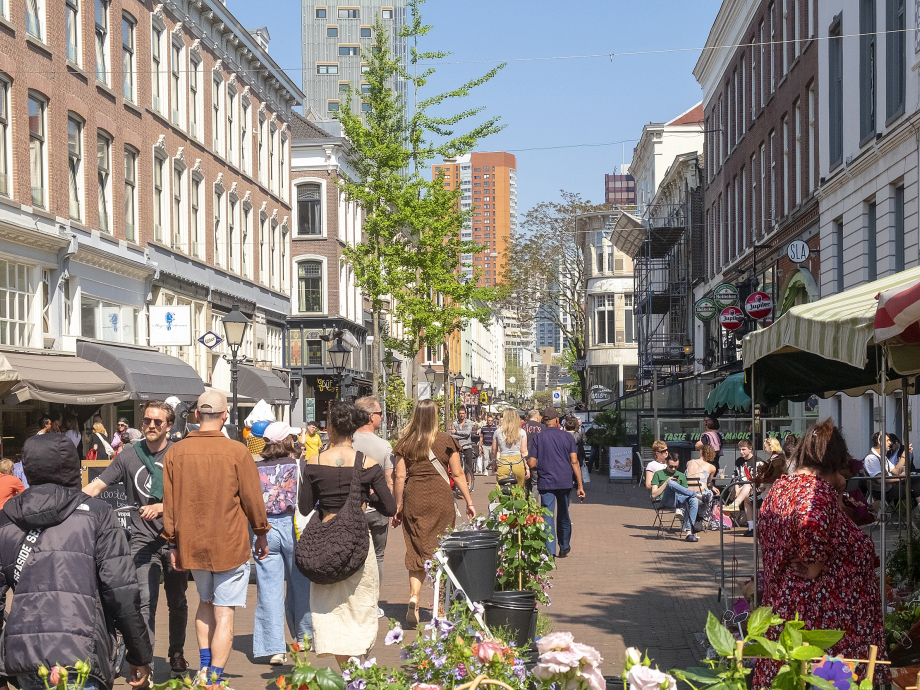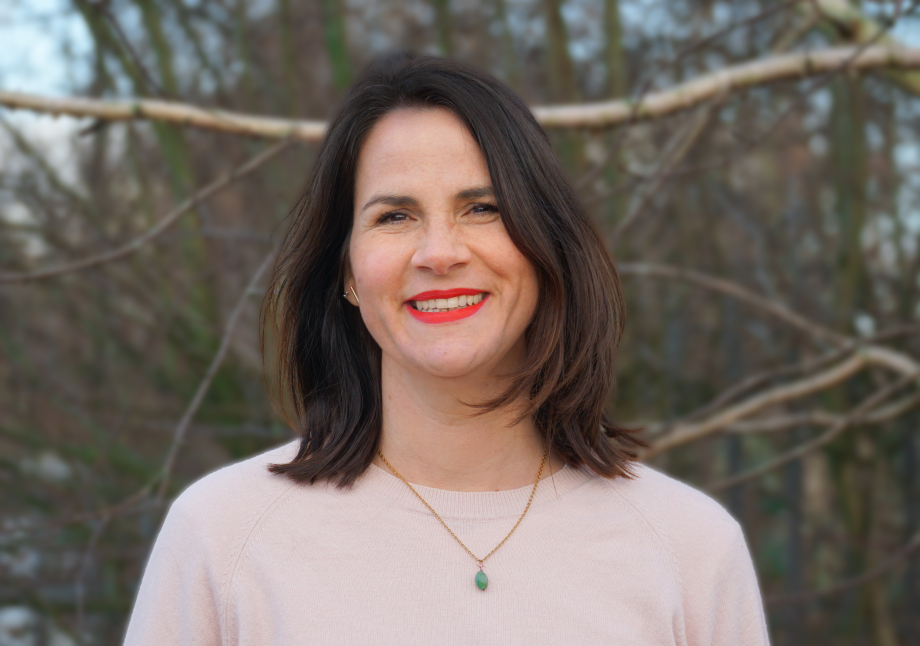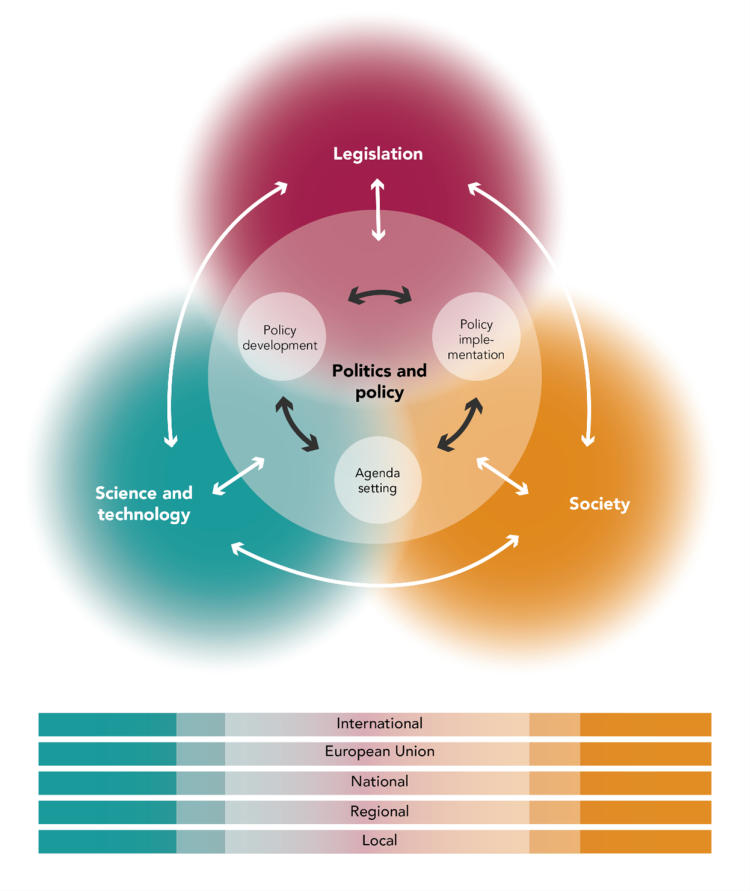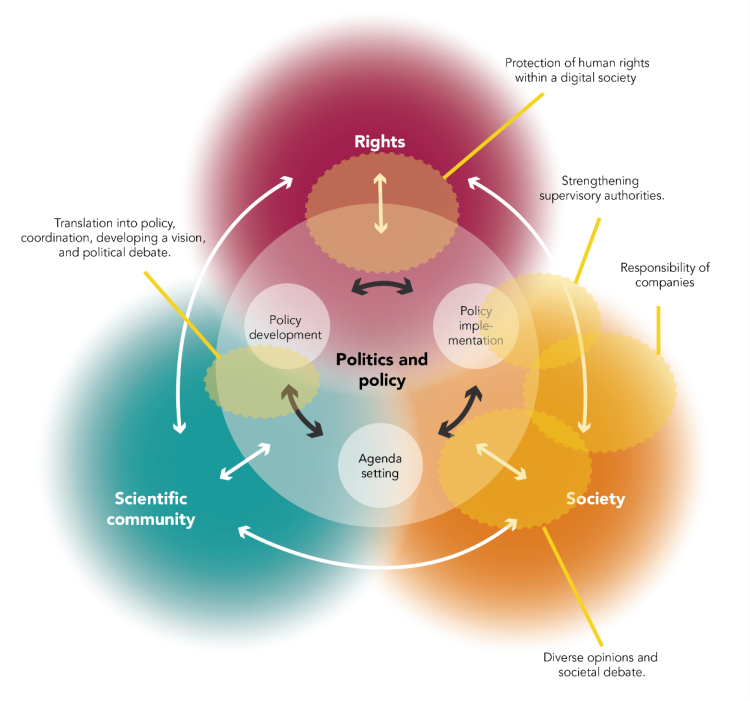Valuable Voices - Democratising science, technology, and innovation
What does it take for science, technology and innovation to contribute to societal challenges? How do we leverage diverse perspectives to achieve socially responsible innovations? And how do we arrive at the necessary knowledge? In this lecture, Eefje Cuppen, director of the Rathenau Instituut, discusses what it means to give society a voice in the development of science, technology and innovation.

Eefje Cuppen spoke at the symposium Voices in society on science, technology and innovation. The symposium was organised by the Rathenau Instituut on Nov. 14, 2024.

Read the publication as a pdf
Voices within society
Two years ago, I became the director of the Rathenau Instituut, which I had been following since I was a student. And I can truly say that this is not a boring time for an institute whose aim is to assist society and politicians to shape their opinions on science, technology, and innovation.
Indeed, society has a pressing need for science, technology, and innovation. Whether it's climate change, keeping good healthcare affordable, our position in a changing geopolitical landscape – for all these issues, science, technology, and innovation are undeniably a vital part of the solution.
But at the same time, we live in a society in which fragmentation between groups seems to be increasing. We look for what can connect us as we seek for solutions to the challenges we experience. There are worries that trust in institutions, such as science and scholarship and the authorities, is declining. Vaccination rates are historically low, and we once more need to start worrying about diseases like measles and whooping cough. That's despite recent studies showing that trust in the authorities among the ‘low- and medium-educated’ has in fact increased significantly over the past two years. The cutbacks that have been announced for education, science, and innovation by the Dutch cabinet are putting further pressure on a system that was already under strain. In its programme of action, the government – paradoxically – frequently cites innovation as a means of tackling a range of thorny issues, such as the agricultural system, pressure on healthcare, the tight labour market, the climate, and defence.
In the same way as there's not just one single ‘society’, there's also not just a single voice within society.
In other words, our society is in a state of constant change. The Rathenau Instituut gives society a voice vis-à-vis politicians and the world of science on issues relating to science, technology, and innovation. But in the same way as there is not just one single ‘society’, there is also not just a single voice within society. By definition, there are various different voices within it – different people with different voices. The Rathenau Instituut pushes for science, technology, and innovation to be developed and applied in such a way that they can help tackle the challenges facing society, with a keen eye on what is at stake for different groups in society.
That sounds marvellous, but as yet it’s by no means a matter of course. The central question is therefore:
What is needed so that science, technology, and innovation can contribute to tackling society's challenges in such a way that the different voices within society are actually heard?
The relationship between science, technology, and innovation and the challenges facing society
Science, technology, and innovation are splendid, and we badly need them. But they also form part of many problems that we now wish to get rid of – indeed, they may have helped cause them. Take, for example, the ubiquity of fossil raw materials in all areas of society and the economy: from fuel for electricity and transport to the production of fertilisers and plastics, and all sorts of other applications in the chemical industry. Let me outline four examples of how science, technology, and innovation relate to societal challenges.
New ways of thinking
Science, technology, and innovation can open up new futures. Scientists come up with new ideas and are often thought leaders. New technologies open up new directions. Just think of how the availability of affordable domestic solar panels has opened up new directions in the energy transition towards local ownership and energy citizenship.
Democratic arena
Science, technology, and innovation provide a democratic arena, a venue for different groups within society to express the values they hold dear, and to champion interests. The protests against the ‘Covid passport’, i.e. the use of digital technologies to monitor citizens, is an example of how technologies can make us aware of the public values that are at stake. Other examples include student protests about collaboration with fossil-based industries and research collaboration with Israeli knowledge institutions. Universities are pre-eminently the place where debate about the diversity of values is and should be encouraged.
Vested interests
But science, technology, and innovation can also obstruct transitions. They can reinforce established values and interests. For example, current research by the Rathenau Instituut on the development of hydrogen in the transition of industry and energy supply shows that it’s a development that is very much dominated by vested interests, leaving little room for involvement on the part of citizens.
Holding back change
Science, technology, and innovation can also act as a way of holding back or sabotaging change. More research is often called for with the very best intentions; there are always uncertainties, which makes it important to carry out more research. After all, there’s always a more perfect solution somewhere ahead: ‘the best is the enemy of the good’. But calling for more research can also be malicious. The book Merchants of Doubt describes a pattern in controversies about global warming, smoking, DDT, acid rain, and the hole in the ozone layer. It’s a pattern of keeping controversies alive by referring to science so as to sow doubt and confusion even after scientific consensus has, in fact, been reached.
The relationship between science, technology, and innovation and societal challenges is thus far from unambiguous. That means it’s also not just a matter of course that science, technology, and innovation will help tackle societal challenges in a way that takes account of what is at stake for different groups within society. That’s all the more so because it’s often not yet entirely clear what exactly is at stake for whom.
The reason I decided to join the Rathenau Instituut two years ago is exactly that: it’s not a matter of course. And that’s precisely why it is so important to have an institute that is assigned by government to fulfil this role on the interface between science and technology, society and politics. The Rathenau Instituut is the only institute within the Dutch knowledge landscape that gives a voice to society as regards developments in science, technology and innovation, and that makes those voices heard in the worlds of politics and science.
Democratic development of science, technology, and innovation
As a scientist, I’ve always viewed myself as independent – ‘as a scientist you’re independent of course’, was how I saw things. I took that so much for granted that I may have taken it a bit too much for granted. It’s only since I started working at the Rathenau Instituut that I’ve really come to realise what it means to exercise that independence – that you can’t take it for granted because it demands work and attention every single day. In everything we do, who we work with, what words we use, whether or not we accept invitations – all our day-to-day decisions are guided by the consideration what they imply when viewed from our independent position.
One’s own position
Particularly in situations involving controversy or strong opinions and positions – which are also often opposed to one another – it can be difficult to determine your own position. At the Rathenau Instituut, we sometimes feel called upon to adopt a position, but in many cases – given the institute's mission and mandate – it may in fact be worthwhile not to do so. Let me be honest and say that I myself don't find that easy at times. It requires you to be courageous, because it's far more of a challenge to adopt your own authentic position – based on recognising the diversity of perspectives and values within society – than to become part of a bubble with certain given patterns of values. Especially in a time of increasing concerns about fragmentation and polarisation, it’s important for there to be people and organisations that adopt a position that recognises and links up the diversity of perspectives.
If we want science, technology, and innovation to really contribute to tackling society's challenges in such a way that the various different voices within society are actually heard, we need to guard against narrowing down the values that lead the development of science, technology, and innovation. It’s the diversity of values that should lead us. The development and organisation of science, technology, and innovation must reflect the diversity of values and perspectives within society, and even reinforce it.
Reinforcing the diversity of values means embracing conflict
For example, innovation is not just about our international competitiveness but also about the autonomy of individuals to make decisions about their own living environment. The development of biomedical technology is not just about health but also about our relationship with life and death. A better understanding of what is at stake for whom helps to critically assess and review the role of science, technology, and innovation as regards the challenges facing society. That reinforces the democratic character of science, technology, and innovation.
Conflict exposes what values are at stake for whom.
If we allow the diversity of values to guide us, that implies that conflict within society is something valuable. For some people, conflict may suggest that something is wrong and needs to be resolved or avoided, but I would argue that conflict is something to embrace, namely for three reasons.
- Conflict is important as a form of political engagement, an inherent component of our democracy.
- Conflict is a source of information about different views and perspectives on an issue. That source of information can be deployed to understand an issue better and to devise new ways of tackling it.
- Embracing conflict early on can, in fact, increase public support for decisions because conflicting perspectives are then taken seriously. And in any case, avoiding or ignoring conflict can cause it to reappear later – often more forcefully. Embracing conflict can also help speed up decision-making.
Conflict exposes what values are at stake and for whom. Embracing conflict means using conflict as a source for understanding what values are at stake for whom. Developers, scientists and policymakers can apply that understanding to enhance the diversity of values in the development of technology, policy, and decision-making.
The system within which science, technology, and innovation develop
The role of the Rathenau Instituut is to enhance the diversity of values as regards science, technology, and innovation. It does this by examining the system within which they are developed and applied. For that purpose, my colleagues developed the ‘governance ecosystem model’ (Figure 1).

The model describes the system within which science, technology, and innovation develop. It consists of four domains at different levels of governance, from local to global: the domain of science and technology, the domain of legislation, the societal domain, and the domain of politics and policy. I find this framework helpful because it helps to identify where there are blind spots within the system and where interventions are needed to enhance the diversity of values and protect public values. If we want to understand the value diversity status as regards a particular technology, we need to examine all these domains, as well as how they interact.
Visions and expectations
Values are to be found not only within society and politics but are also embedded in technologies themselves. Take, for instance, a smartphone that’s designed primarily for male hands, or algorithms that disadvantage or discriminate against certain groups. A district heating network may only be profitable if all the households in a district are connected to it, thus restricting individual freedom of choice. In all four domains of the governance ecosystem, certain values are prioritised, actors operate who prioritise certain values, and decisions are made – whether implicitly or explicitly, consciously or unconsciously – to promote or not promote certain technologies, or to do so in a certain manner, or to block them.
Visions and expectations as to how a particular technology will help society play a crucial role in the governance ecosystem. Expectations about how a technology can contribute to tackling societal challenges are mainly determined by the actors involved in developing it, such as scientists, experts, and policymakers. Expectations are never just expectations – they wield power. They mobilise people and resources, shaping the future by bringing certain technological futures closer – but not certain others.
For the democratic development and governance of science, technology, and innovation, it’s therefore important to accommodate a wide range of perspectives and values that exist among different groups within society. That is what we do at the Rathenau Instituut – we give individuals a voice. The institute enables people to have a say in the future that is being shaped by science, technology, and innovation..
Interventions
The Rathenau Instituut applied the governance ecosystem model for the first time to the digitalisation of society. Figure 2 shows the result of an analysis that was carried out in 2017. It shows what interventions were needed at that time in each of the domains, such as strengthening monitoring bodies, broadening public debate, and ensuring human rights in the legal domain. Our study was an important contribution to both the creation of the permanent Committee on Digital Affairs in the Dutch House of Representatives, and to Dutch digitalisation policy with its explicit emphasis on public values.

The Rathenau Instituut utilises this model to consider what action it should take. In practice, this varies from one issue to another. Here are a few examples. Where the use of digital technology in public domains such as healthcare, education and public services is concerned, we analyse the extent to which those domains are dependent on technology companies and the consequences that dependence has. Public domains are dependent on a small number of big commercial technology companies, and that brings with it major risks. In this case, we draw attention to the importance of reducing such dependence, for example by developing public infrastructures. When scientists are developing new biomedical technologies, we engage with patient organisations, for example, to understand what they consider to be important. We provide feedback about what we have learned from them to the scientists, so that they can take account of it in developing the technology further. And where innovation policy is concerned, the Rathenau Instituut ensures that societal challenges and society's values and interests take centre stage, as opposed to only the needs of industry or only the country’s earning capacity.
The science system within society
We desperately need science if we are to tackle major challenges in such areas as climate, health, agriculture, and nutrition. Higher education institutions are therefore paying increasing attention to the social impact of their research.
There is still quite some work to be done, however, if science is to play its role effectively. In a study earlier this year, the Rathenau Instituut showed that science policy instruments for this purpose are not yet sufficiently developed. Another study by the institute showed that despite universities designating societal impact as one of the core tasks of researchers, the initiative for implementing it – the national Recognition & Rewards Programme – still enjoys little awareness among researchers. Only about a quarter of researchers are fully aware of this initiative and a third – in particular young researchers, who are the ones who need it most – have never even heard of it.
So despite movements to bring about change in science and in its culture, structure and relationship to society, the science system is dominated by the values that have traditionally been strong within it, for example competition, individual excellence, research rather than teaching, and power differentials between disciplines.
It’s therefore heartening that there are initiatives at a number of universities by staff who recognise that universities need to organise themselves differently. And that is very much needed. Science finds itself facing a number of major challenges. The workload is high (in fact too high), there is a great deal of uncertainty among young researchers about their job prospects, and indications of problems with social safety and inappropriate behaviour are piling up. As if that were not enough, the Dutch government has also announced harsh cuts in funding
Universities are -very understandably- in turmoil because of the cuts that have been announced. And yes, money is certainly important for tackling some of the persistent problems, such as the workload and the retention of talent. But more money in the same system is not going to solve the problems facing science.
The system itself needs to change. In responding to the cuts that have been announced, let us guard against the reflex of wanting to revert to the way things used to be. That's because some courageous choices will now need to be made – and perhaps precisely now – to ensure that the quality of Dutch science remains high and that its immense value to society is preserved.
There is work to be done to ensure that the quality of Dutch science remains high and its immense value to society is preserved.
Curiosity and courage
Let me get back to the central question in my account:
What is needed so that science, technology, and innovation can contribute to tackling society's challenges in such a way that the different voices within society are actually heard?
My answer comprises various ingredients:
• a proper understanding of what values are at stake, and for whom;
• ensuring that people have a voice and can form an opinion about science, technology, and innovation;
• enhancing the diversity of values;
• embracing conflict;
• interventions in the system within which science, technology, and innovation are developed and applied, based on an analysis of the blind spots in that system.
What this all basically adds up to is democratising science, technology, and innovation.
But it also needs to be clear that these are just ingredients in a continuous quest for an answer. Guiding developments in science, technology, and innovation in such a way that they can actually contribute to tackling societal challenges and genuinely accommodate the diversity of values is far from simple or self-evident. That is why, in conclusion, I’d like to add two more ingredients: a strong dose of curiosity about other people's perspectives, and a hearty helping of courage to question one's own perspective. That is what I wish for all of us.
The full bibliography and footnotes are available in the pdf at the top of this page.